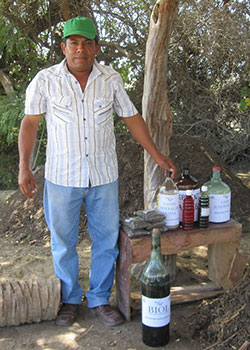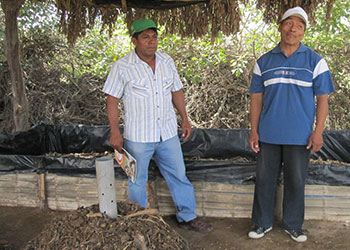Story by Diana Odar and Monica Dykas | Volunteers | Heifer Peru
Photos by Diana Odar | Volunteer | Heifer Peru

Carlos Josué Ayala Martinez is 49 years old, single and lives with his family in Pueblo Nuevo de Colán in the Piura Region of Perú. He takes care of both his parents and his diabetic sister. Carlos’ father was a farmer, so it was customary that Carlos would also be a farmer. The main crops he cultivated before joining Heifer International’s project were corn, cotton and a few vegetables for his family to eat—all with mostly conventional farming practices using urea and other chemicals. Carlos spent a significant amount of his income and farm earnings in buying fertilizers, pesticides and other chemicals to maintain his farm. He was rarely making a profit and could barely feed himself and his family.
Carlos heard about a local Heifer Peru project by attending a community meeting and talking with other people in his community. The project in his area is Sustainable Livelihoods in the Rural Community of San Lucas de Colán.
"I always went to the community meetings because I know people there and we find out about what is happening in town," Carlos said. "Some friends told me about an agroecological school that would last eight months and would have workshops, classes and trainings on farming—all sponsored by Heifer Peru. So I decided to go and see what I could learn."
Carlos participated in workshops about compost preparation, organic fertilizers, crop management, agroecological policies, and other topics."My favorite workshop was the one where I learned to prepare organic fertilizers. I did not know the importance of manure. I raised animals in the past and people would come and volunteer to clean out my animals pens for free and I let them not knowing its value. Now, I know this manure is one of the main components for organic fertilizers and manure even by itself can be sold, but I used to give it away for free. At the school, I also received materials, such as a large jerry can, a hose, hydrated lime, sulfur and soap all to make fertilizer."
Carlos learned about more than farming. Through the Heifer Peru, he received training and information about caring for the earth and sustainability. These were new concepts to Carlos, and now he no longer leaves plastic containers in the fields because the plastics decompose and pollute the environment. He also understands the idea of repurposing farming materials and resources that he already has to support the sustainability of his farm.
Now Carlos is excited. Every chance he has, Carlos shares the training and knowledge he received with others. Carlos and his friend, Fredy, have replicated the trainings and purchased new materials and now invite people to their own workshops to teach others about the importance and benefits of ecological agriculture and how to prepare organic fertilizers. Usually, about 12 people come to each meeting; Carlos and Fredy are very pleased to see people attending and interested in learning these techniques.

Thanks to the agroecological schools and the new way he is farming, Carlos feels that a great economic burden has been lifted. The monetary savings are more visible because the fertilizer investment is minimal, sometimes even zero, since Carlos collects manure from his animal pens or gets it for free from his friends—and he usually already has the other ingredients. "Now, every time I go to sow, I do not have to worry about money for the conventional fertilizers and I get healthier products. It is a great relief to know that I can make my fertilizer at home."
Carlos and Fredy also started making organic fertilizer to sell. They make the fertilizers, pack them, label them, and take them to the local market. They advertise their products in the community meetings and sometimes in meetings with regional fruit producers who come through to buy and sell. When they sell the products, Carlos and Fredy explain to customers how to use the product and the importance of maintaining organic crops.
Besides having gone to the agroecological school, Carlos also attended animal health workshops where he learned to vaccinate and differentiate diseases in animals. "I'm known in the town not only for organic fertilizers, but now as a veterinarian. There are times that people look for me to vaccinate their animals, so usually I go to help them." His veterinary services in the town provide him with an extra income.
Carlos has a sister who sells vegetables in the market. Before learning about organic farming, his sister sold vegetables that were conventionally grown. Now, Carlos and his sister sell organic vegetables. "We have more confidence that our products will sell out every time. People know that our stall sells organic vegetables and they spread the word to others; every time we have products available, people buy them. People definitely trust our products," Carlos said.
He is grateful to Heifer Peru for providing this project and these workshops that gave him the skills which are now his financial livelihood. The workshops have given him greater knowledge and he looks forward to passing on that knowledge to others. "Thanks to Heifer, I feel satisfied with what I do now; I know it is good that farmers learn to practice organic farming because it is the best for our health and for the environment. I try to share this with my community and I hope that my family and the generations to come continue practicing organic agriculture."